|
75 Jaar Jean M. Auelxml:namespace prefix = o ns = "urn:schemas-microsoft-com:office:office" />
De Amerikaanse schrijfster Jean Marie Auel werd geboren op 18 februari 1936 in Chicago. Zie ook mijn blog van 18 februari 2007 en ook mijn blog van 18 februari 2008 en ook mijn blog van 18 februari 2009 en ook mijn blog van 18 februari 2010. Jean M. Auel viert vandaag haar 75e verjaardag.
Uit: The Land of Painted Caves
The band of travelers walked along the path between theclear sparkling water of Grass River and theblack-streaked whitelimestone cliff, following the trail that paralleled the right bank. They went single fi le around the bend where the stone wall jutted out closerto the waters edge. Ahead a smaller path split off at an angletowardthe crossing place, where the fl owing water spread out and becameshallower, bubbling around exposed rocks.Before they reached the fork in the trail, a young woman near thefront suddenly stopped, her eyes opening wide as she stood perfectly still, staring ahead. She pointed with her chin, not wanting to move.Look! Over there! she said in a hissing whisper of fear. Lions!Joharran, the leader, lifted his arm, signaling the band to a halt. Justbeyond the place where the trail diverged, they now saw pale-tawny cave lions moving around in the grass. The grass was such effectivecamoufl age, however, that they might not have noticed them untilthey were much closer, if ithadnt been for the sharp eyes of Thefona.The young woman from the Third Cave had exceptionally good vi-sion, and though she was quite young, she was noted for her ability tosee far and well. Her innate talent had been recognized early and they had begun training her when she was a small girl; she was their bestlookout.Near the back of the group, walking in front of three horses, Aylaand Jondalar looked up to see what was causing the delay.
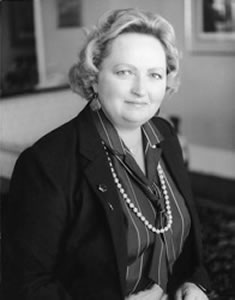
Jean M. Auel (Chicago, 18 februari 1936)
De Hongaarse schrijver en journalist Mór Jókai werd geboren op 18 februari 1825 in Komárom. Zie ook mijn blog van 18 februari 2009 en ook mijn blog van 18 februari 2010.
Uit: The Barons Sons (Vertaald door Percy Favor Bicknell)
The post-prandial orator was in the midst of his toast, the champagne-foam ran over the edge of his
glass and trickled down his fat fingers, his lungs were expanded and his vocal chords strained to the utmost in the delivery of the well-rounded period upon which he was launched, and the blood was rushing to his head in the generous enthusiasm of the moment. In that brilliant circle of guests every man held his hand in readiness on the slender stem of his glass and waited, all attention, for the toast to come to an end in a final dazzling display of oratorical pyrotechnics. The attendants hastened to fill the half-empty glasses, and the leader of the gypsy orchestra, which was stationed at the farther end of the hall, held his violin-bow in the air, ready to fall in at the right moment with a burst of melody that should drown the clinking of glasses at the close of the toast.
At this point the family physician entered noiselessly and whispered a few .words in the ear of the
hostess, who was presiding at the banquet, and who immediately rose and, with a mute gesture of apology to those of the guests who sat near her, withdrew from the room. Meanwhile the orator continued :
" May that honoured man who, like a second Atlas, bears the burden of our country on his shoulders,
whom all future ages will reverence as the type of true patriotism, who is the leader of our party's forces in their march to victory, and whom we all regard as our light-giving pharos, a tower of strength to our side and the bulwark of our cause, though at present he is unfortunately unable to be with us in person,may he, I say, live to enjoy renewed health and strength and to bear forward the banner of his party for many, many years to come !
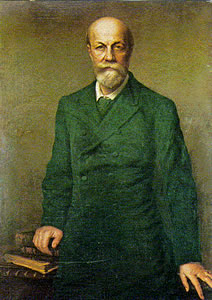
Mór Jókai (18 februari 1825 5 mei 1904)
De Duitse schrijfster Hedwig Courths-Mahler werd geboren in Nebra (Saksen-Anhalt) op 18 februari 1867. Zie ook mijn blog van 18 februari 2009 en ook mijn blog van 18 februari 2010.
Uit: Ich lieb' in dir die ganze Welt
Umso besser, wenn du dich in sie verlieben kannst, Lothar. Jedenfalls musst du alles daran setzen, sie zu bestimmen, deine Frau zu werden, und zwar so bald wie möglich.
Ja doch, Lilly, das ist doch ausgemachte Sache, erwiderte der Graf. Aber übers Knie brechen lässt sich so etwas nicht, fügte er hinzu.
Die Komtess seufzte. Am besten wäre es, du bist schon einig mit ihr, ehe Rüdiger wieder heimkommt. Bedenke nur, welch ein Triumph das für dich wäre, wenn du als Herr über Rottberg sein Nachbar würdest. Dann brauchtest du dich nicht mehr vor ihm zu ducken, dann wärst du mindestens so reich wie er. Und du könntest ihm den Bettel vor die Füße werfen, den er dir jetzt wie ein Gnadengeschenk zuwirft.
Graf Lothar atmete tief durch. Ja, Gott, das wünsche ich auch. Ich habe dieses Leben satt. Mit Zittern und Zagen denke ich an die Klemme, in der ich jetzt wieder sitze. Ich habe wieder verwünschtes Pech im Spiel gehabt und muss Rüdiger beichten, sobald er heimkommt. Das wird wieder einen schönen Sermon geben, zumal jetzt, wo er in so scheußlicher Stimmung sein wird. Ich bin nur neugierig, wie die ganze Chose in Berlin verlaufen ist. Schade, dass wir noch nichts gehört haben.
In diesem Moment kam Annedore heran. Graf Lothar sprang auf und ging der Baroness entgegen. Endlich geht die Sonne wieder auf!, sagte er, ihr den Arm mit einer eleganten Verbeugung reichend.
Die Baroness errötete. Sie irren, Graf Lothar, die Sonne wird bald untergehen.
Meine Sonne hoffentlich nicht, erwiderte er schmachtend. Ich habe Sie mit Sehnsucht erwartet.
Sie nahmen am Teetisch Platz. Lilly füllte selbst die Tassen und reichte sie dem Bruder und Annedore.
Ist immer noch keine Nachricht von Graf Rüdiger eingetroffen?, fragte Annedore.
Nein, noch immer nicht. Unser Bruder ist, wie immer, sehr rücksichtslos uns gegenüber und lässt es uns stets in kränkender Weise spüren, dass wir hier nur geduldet sind, obgleich Lindeck unser Vaterhaus ist wie das seine.
Oh, das ist hässlich!, sagte Annedore entrüstet.
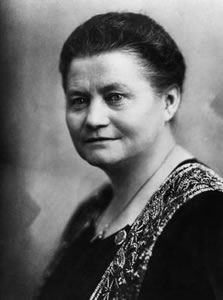
Hedwig Courths-Mahler (18 februari 1867 - 26 november 1950)
De Noorse schrijver Alexander Lange Kielland werd geboren in Stavanger op 18 februari 1849. ook mijn blog van 18 februari 2009 en ook mijn blog van 18 februari 2010.
Uit: Tales of Two Countries (Vertaald door William Archer)
She had mounted the shining marble steps with without mishap, withoutlabor, sustained by her great beauty and her fine nature alone. She hadtaken her place in the salons of the rich and great without laying forher admittance with her honor or her good name. Yet no one could saywhence she came, though people whispered that it was from the depths.
As a waif of a Parisian faubourg, she had starved through her childhoodamong surroundings of vice and poverty, such as those only can conceivewho know them by experience. Those of us who get our knowledge frombooks and from hearsay have to strain our imagination in order to forman idea of the hereditary misery of a great city, and yet our mostterrible imaginings are apt to pale before the reality.
It had been only a question of time when vice should get its clutchesupon her, as a cog-wheel seizes whoever comes too near the machine. After whirling her around through a short life of shame and degradation, it would, with mechanical punctuality, have cast her 17off into somecorner, there to drag out to the end, in sordid obscurity, hercaricature of an existence.
But it happened, as it does sometimes happen, that she was "discovered"by a man of wealth and position, one day when, a child of fourteen, shehappened to cross one of the better streets. She was on her way to adark back room in the Rue des Quatre Vents, where she worked with awoman who made artificial flowers.
It was not only her extraordinary beauty that attracted her patron;her movements, her whole bearing, and the expression of her half-formedfeatures, all seemed to him to show that here was an originally finenature struggling against incipient corruption. Moved by one of theincalculable whims of the very wealthy, he determined to try to rescuethe unhappy child.
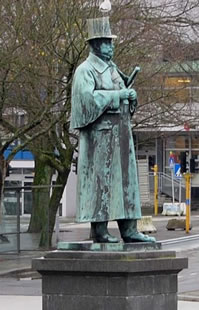
Alexander Kielland (18 februari 1849 - 6 april 1906)
Standbeeld in Stavanger
De Afro-Amerikaanse schrijfster, dichteres en lesbisch-feministische, anti-racistische activiste Audre Geraldine Lorde werd geboren op 18 februari 1934 in New York. Zie ook mijn blog van 18 februari 2009 en ook mijn blog van 18 februari 2010.
Making Love To Concrete
An upright abutment in the mouth
of the Willis Avenue bridge
a beige Honda leaps the divider
like a steel gazelle inescapable
sleek leather boots on the pavement
rat-a-tat-tat best intentions
going down for the third time
stuck in the particular
You cannot make love to concrete
if you care about being
non-essential wrong or worn thin
if you fear ever becoming
diamonds or lard
you cannot make love to concrete
if you cannot pretend
concrete needs your loving
To make love to concrete
you need an indelible feather
white dresses before you are ten
a confirmation lace veil milk-large bones
and air raid drills in your nightmares
no stars till you go to the country
and one summer when you are twelve
Con Edison pulls the plug
on the street-corner moons Walpurgisnacht
and there are sudden new lights in the sky
stone chips that forget you need
to become a light rope a hammer
a repeatable bridge
garden-fresh broccoli two dozen dropped eggs
and a hint of you
caught up between my fingers
the lesson of a wooden beam
propped up on barrels
across a mined terrain
between forgiving too easily
and never giving at all.

Audre Lorde (18 februari 1934 17 november 1992)
De Amerikaanse schrijver Wallace Stegner werd geboren op 18 februari 1909 in Lake Mills, Iowa. Zie ook mijn blog van 18 februari 2009 en ook mijn blog van 18 februari 2010.
Uit: Crossing to Safety
Floating upward through a confusion of dreams and memory, curving like a trout through the rings of previous risings, I surface. My eyes open. I am awake.
Cataract sufferers must see like this when the bandages are removed after the operation: every detail as sharp as if seen for the first time, yet familiar too, known from before the time of blindness, the remembered and the seen coalescing as in a stereoscope.
It is obviously very early. The light is no more than dusk that leaks past the edges of the blinds. But I see, or remember, or both, the uncurtained windows, the bare rafters, the board walls with nothing on them except a calendar that I think was here the last time we were, eight years ago.
What used to be aggressively spartan is shabby now. Nothing has been refreshed or added since Charity and Sid turned the compound over to the children. I should feel as if I were waking up in some Ma-and-Pa motel in hard-times country, but I dont. I have spent too many good days and nights in this cottage to be depressed by it.
There is even, as my eyes make better use of the dusk and I lift my head off the pillow to look around, something marvelously reassuring about the room, a warmth even in the gloom. Associations, probably, but also color. The unfinished pine of the walls and ceilings has mellowed, over the years, to a rich honey color, as if stained by the warmth of the people who built it into a shelter for their friends. I take it as an omen; and though I remind myself why we are here, I cant shake the sense of loved familiarity into which I just awoke.
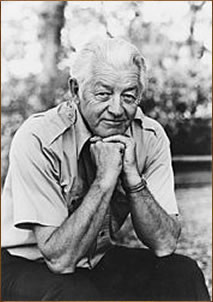
Wallace Stegner (18 februari 1909 13 april 1993)
|



